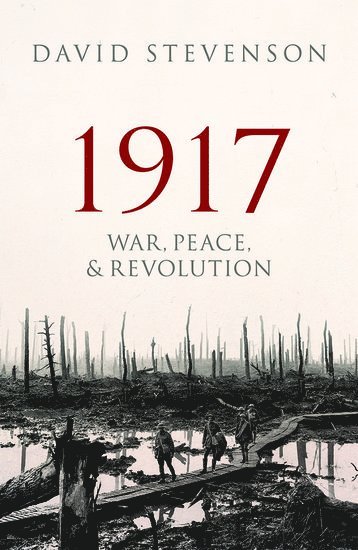
- Format
- Häftad (Paperback / softback)
- Språk
- Engelska
- Antal sidor
- 528
- Utgivningsdatum
- 2019-07-25
- Förlag
- Oxford University Press
- Dimensioner
- 234 x 155 x 38 mm
- Vikt
- Antal komponenter
- 1
- ISBN
- 9780198702399
- 681 g
1917
War, Peace, and Revolution
- Skickas från oss inom 2-5 vardagar.
- Fri frakt över 249 kr för privatkunder i Sverige.
Passar bra ihop
De som köpt den här boken har ofta också köpt Abundance av Ezra Klein, Derek Thompson (häftad).
Köp båda 2 för 448 krKundrecensioner
Fler böcker av David Stevenson
-
The Origins of Freemasonry
David Stevenson, David Stevenson
-
With Our Backs to the Wall
David Stevenson
-
1914-1918
David Stevenson
-
Arms Races in International Politics
Mahnken Et Al, Thomas Mahnken, Joseph Maiolo, David Stevenson
Recensioner i media
Gary Sheffield, BBC History Magazine 1917 is a triumph by a masterly historian, and one of the most important books to have been published during the centenary years of the First World War.
Robert Gerwarth, Literary Review 1917 will be of great interest to those readers who wish to better understand the broader implications of strategic and diplomatic decisions during the penultimate year of the conflict. It is in that field that Stevenson is an unrivalled master and his comprehensively researched book on 1917 will be welcomed by many.
All About History Masterful ... this is a fascinating study of one of the most tumultuous years of the 20th century.
Peter Morgan, Military History Magazine A welcome addition to the literature that challenges the all-too-safe and pernicious stereotypes of the history of the First World War that unfortunately still dominate popular culture.
Wm. Roger Louis, Wall Street Journal 1917 is a sound, learned work of breadth and insight, a study of the year 1917 as a microcosm of the war itself.
Publishers Weekly, Starred Review Stevenson's comprehensively researched and perceptively reasoned analysis stands apart from similar histories by showing that the conflict's outcome was determined not through blind impersonal forces but through deliberate will.
Gregory J. Dehler, Michigan War Studies Review 1917: War, Peace, and Revolution represents a thoughtful synthesis of relevant secondary literature and published primary and archival sources. Its narrative is enriched by an invaluable bibliography, maps and photographs spread throughout the text, and helpful lists of abbreviations and principal personalities. It is a seminal work that will engage and inform students, scholars, and general readers alike.
Jay Winter, Yale University David Stevenson's book is a cool and original account of the heat of war in 1917. It surpasses previous studies in terms of its global range and its archival depth. Here is a history of decision-making by the sleepwalkers who kept on their murky path into war three years after its outbreak, and of those few - including Lenin - who found a way out of the slaughterhouse. Stevenson's is history as tragedy, with hubris bringing down those who thought they could master the destructive forces of the Great War.
Holger Afflerbach, University of Leeds The European nations had dug themselves by 1917 into a war trap seemingly without exit - this is the starting point of David Stevenson's new book. The events of 1917, war, peace, and revolution, the struggle to get out of the war, get here a thorough reassessment. The book is an example for the combination of competent analysis with a gripping narrative and clear judgement.
Övrig information
David Stevenson holds the Stevenson Chair of International History at the London School of Economics & Political Science, where he has twice been Head of Department and teaches and lectures on the history of international relations. He is the author or editor of seven books about the origins, course, and consequences of the First World War. His publications include Armaments and the Coming of War: Europe, 1904-1914 (OUP, 1996), 1914-1918: the History of the First World War (Penguin, 2004), With Our Backs to the Wall: Victory and Defeat in 1918 (Penguin, 2011), and Arms Races in International Politics: from the Nineteenth to the Twenty-First Century (OUP, 2016), co-edited with Thomas Mahnken and Joseph Maiolo.
Du kanske gillar
-
Peak Human
Johan Norberg
Inbunden -
Trading Game
Gary Stevenson
Häftad -
Man and His Symbols
C G Jung
Häftad


